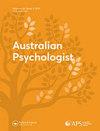“The only man on the mat”: yoga as a therapeutic pathway for men’s mental health
IF 2
4区 心理学
Q2 PSYCHOLOGY, MULTIDISCIPLINARY
引用次数: 2
Abstract
ABSTRACT Objective Men’s engagement in mental health treatment significantly lags behind that of women, despite prevalence rates highlighting that poor mental health is a public health issue shared equally between them. As such, examination of complementary and alternative mental health approaches that might support men’s mental health is crucial. The aim of this study was to explore the benefits and barriers associated with ongoing yoga practice among men currently attending community-based yoga classes, with an emphasis on identifying mental health outcomes. Method Qualitative data was gathered through semi-structured interviews with 14 men practicing yoga and analysed using thematic analysis. Results Themes related to six main aspects, including: a) being the only man in a yoga class, b) perceiving deeper elements of the practice and c) yoga and healthy ageing. Conclusions Findings from this study extend upon existing research supporting lifestyle interventions as an efficacious mental health treatment approach and provide support for initiatives enabling greater access to yoga among men. Factors influencing adoption and ongoing engagement are discussed accordingly. KEY POINTS What is already known about this topic: Men experience substantial rates of mental illness, yet significant barriers remain for accessing and engaging with treatment options. As a lifestyle intervention with established benefits, yoga is a promising approach for supporting men’s mental health. The barriers and enablers to men adopting and maintaining a yoga practice are not well understood. What this topic adds: Benefits of combining improved flexibility and increasing mindfulness improved mental health in specific ways. Ongoing outcomes also led to self-discovery, serving as further motivation for maintaining regular practice. Participants noted yoga’s capacity to improve mental and physical health across the lifespan.“垫子上唯一的男人”:瑜伽是男性心理健康的治疗途径
摘要目的男性在心理健康治疗方面的参与度明显落后于女性,尽管患病率突显出心理健康状况不佳是他们平等分担的公共卫生问题。因此,研究可能支持男性心理健康的补充和替代心理健康方法至关重要。这项研究的目的是探索目前参加社区瑜伽课程的男性进行瑜伽练习的好处和障碍,重点是确定心理健康结果。方法通过对14名瑜伽练习者的半结构化访谈收集定性数据,并采用主题分析法进行分析。结果主题涉及六个主要方面,包括:a)成为瑜伽课上唯一的男人,b)感知练习的深层元素,c)瑜伽和健康衰老。结论这项研究的结果扩展了支持生活方式干预作为一种有效的心理健康治疗方法的现有研究,并为男性更多地使用瑜伽的举措提供了支持。相应地讨论了影响采用和持续参与的因素。关键点关于这个话题已经知道的是:男性患精神疾病的几率很高,但在获得和参与治疗选择方面仍然存在重大障碍。瑜伽作为一种具有既定益处的生活方式干预措施,是支持男性心理健康的一种很有前途的方法。男性采用和保持瑜伽练习的障碍和促成因素尚不清楚。本主题补充道:提高灵活性和增加正念相结合的好处在特定方面改善了心理健康。持续的结果也导致了自我发现,成为保持常规练习的进一步动机。参与者注意到瑜伽在整个生命周期中都能改善身心健康。
本文章由计算机程序翻译,如有差异,请以英文原文为准。
求助全文
约1分钟内获得全文
求助全文
来源期刊

Australian Psychologist
PSYCHOLOGY, MULTIDISCIPLINARY-
CiteScore
3.70
自引率
5.30%
发文量
32
期刊介绍:
The Australian Psychologist is the official applied practice and public policy journal of the Australian Psychological Society. As such, the journal solicits articles covering current issues in psychology, the science and practice of psychology, and psychology"s contribution to public policy, with particular emphasis on the Australian context. Periodically, Australian Psychological Society documents, including but not limited to, position papers, reports of the Society, ethics information, surveys of the membership, announcements, and selected award addresses may appear in the journal.
 求助内容:
求助内容: 应助结果提醒方式:
应助结果提醒方式:


